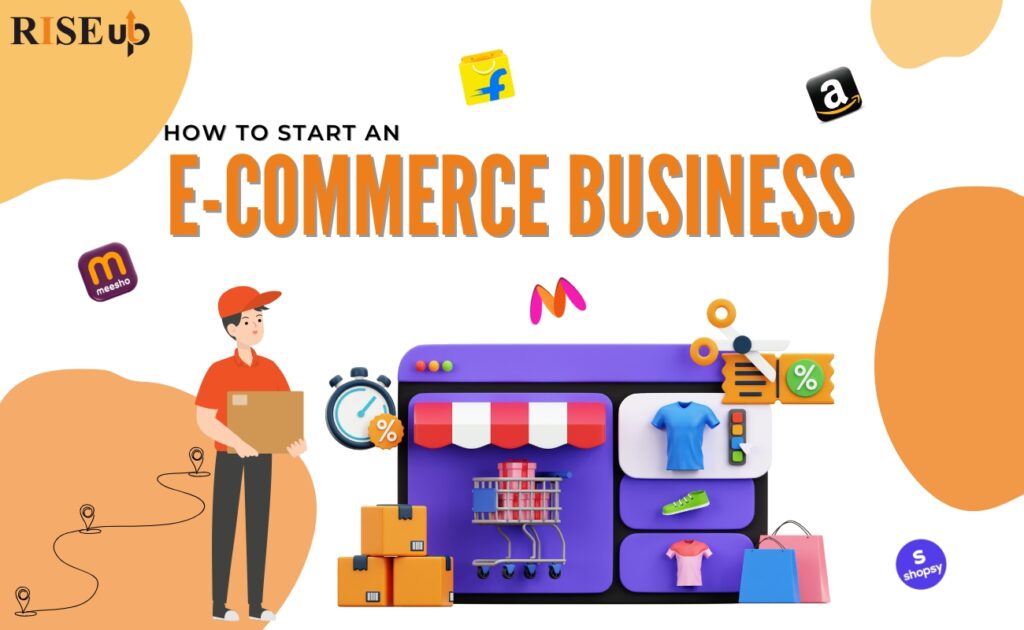
Starting an e-commerce business is an exciting journey, but it can feel overwhelming if you’re unsure where to begin. Fortunately, with the right strategy and tools, anyone can learn how to start an e-commerce business and thrive in the digital marketplace. In this guide, we’ll walk you through the essential steps to set up your e-commerce store, optimize your processes, and build a successful online business with RiseUp by your side.
1. Decide What You Want to Sell
One of the first questions you’ll face when learning how to start an e-commerce business is, “What do I want to sell?” This decision is crucial because it impacts everything from your marketing strategy to your pricing structure.
- Research Market Demand: Use tools like Google Trends, Amazon Best Sellers, or Etsy to identify trending products and evaluate market demand.
- Evaluate Competitors: Analyze existing businesses and find your unique selling proposition (USP).
- Passion and Knowledge: If you’re passionate about your product, it will be much easier to engage with customers and market it effectively.
RiseUp Tip: Choose a niche that you genuinely care about. Whether it’s eco-friendly fashion or tech gadgets, focusing on something you’re passionate about can give you an edge in a competitive market.
2. Choose Your E-commerce Business Model
Understanding how to start an e-commerce business involves selecting the right business model. There are several models to consider:
- Business-to-Consumer (B2C): Selling directly to consumers, this is the most common e-commerce model.
- Business-to-Business (B2B): Selling products in bulk to other businesses.
- Dropshipping: This model allows you to sell products without holding inventory, making it a great option for beginners.
- Subscription-Based Models: Recurring deliveries of products can create stable revenue streams.
RiseUp Suggestion: For beginners, dropshipping is an excellent model. It minimizes upfront costs, allowing you to focus on learning how to start an e-commerce business without worrying about inventory management.
3. Choose an E-commerce Platform
Now that you’ve decided on your product and model, it’s time to choose an e-commerce platform. The right platform is essential for running your online store smoothly. Here are some popular platforms to consider:
- Shopify: A user-friendly platform perfect for beginners, with easy integrations for payments, shipping, and marketing.
- WooCommerce: If you already use WordPress, WooCommerce is an ideal plugin to turn your site into a fully functional e-commerce store.
- BigCommerce: Great for larger businesses or those looking to scale quickly.
RiseUp Tip: We recommend Shopify for first-time e-commerce entrepreneurs. It simplifies the process of learning how to start an e-commerce business and has built-in features that make setup easy.
4. Register Your Business and Choose a Name
Before you can start selling online, you need to legally register your business. Make sure to:
- Register your business name and domain.
- Choose a business structure (e.g., LLC, Sole Proprietorship).
- Obtain any necessary licenses and permits for selling your products.
How to Start an E-commerce Business involves thinking about branding early on. Your business name is the first impression your customers will have, so choose wisely. Make sure it’s memorable, easy to spell, and reflects your niche.
RiseUp Insight: A good name will not only help you stand out but also make your brand easier to find online. Use tools like Namecheap or GoDaddy to ensure your domain is available.
5. Design Your Online Store
Once you have your platform set up, the next step in learning how to start an e-commerce business is designing your store. This is where your customers will interact with your products, so make it a seamless and attractive experience.
- Product Pages: Add high-quality images, detailed descriptions, and accurate pricing.
- User Experience (UX): The more intuitive and user-friendly your website, the more likely people are to make a purchase.
RiseUp Tip: A clean, visually appealing website will not only make your store look professional but will also build trust with your customers.
6. Set Up Payment Gateways and Shipping
As you dive deeper into how to start an e-commerce business, setting up payment gateways and shipping methods is critical to running a successful online store.
- Payment Gateways: PayPal, Stripe, and Square are among the most commonly used systems for processing online payments.
- Shipping Methods: Decide whether to offer free shipping, flat-rate shipping, or real-time calculated shipping costs.
RiseUp Suggestion: Offer multiple payment options to cater to customer preferences. Having a secure and simple checkout process increases the likelihood of completed sales.
7. Market Your E-commerce Store
Now that your e-commerce store is live, it’s time to promote it. Here’s how to effectively market your store as you learn how to start an e-commerce business:
- Social Media Marketing: Engage with potential customers on platforms like Instagram, Facebook, and TikTok.
- Search Engine Optimization (SEO): Optimize your website for search engines to ensure your products show up when people search for relevant terms.
- Email Marketing: Build an email list and send updates, promotions, and personalized offers to your subscribers.
RiseUp Marketing Tip: Consistency is key. Post regularly on social media and keep your email list active by sending valuable content. Build relationships with your customers, and they’ll come back for more.
8. Track, Analyze, and Scale
As you continue to learn how to start an e-commerce business, measuring your performance is crucial. Use tools like Google Analytics to track:
- Website Traffic: Know where your visitors are coming from.
- Sales Conversions: Track how many of your website visitors actually make a purchase.
- Customer Behavior: Understand what products or pages are most popular.
RiseUp Tip: Regularly reviewing your analytics helps you refine your strategies and adjust your approach. It’s essential to continually improve and scale your e-commerce business to achieve long-term success.
Conclusion: Take the Leap and RiseUp
Now that you know how to start an e-commerce business, it’s time to take action! RiseUp is here to support you every step of the way. From choosing the right products to building a successful marketing strategy, we provide the tools and expertise to ensure you succeed.
Are you ready to rise to the occasion and launch your e-commerce business? Let RiseUp guide you to success—start today and turn your vision into reality!
IF YOU WANT DIGITAL MARKETING SERVICES PLEASE CLICK HERE
